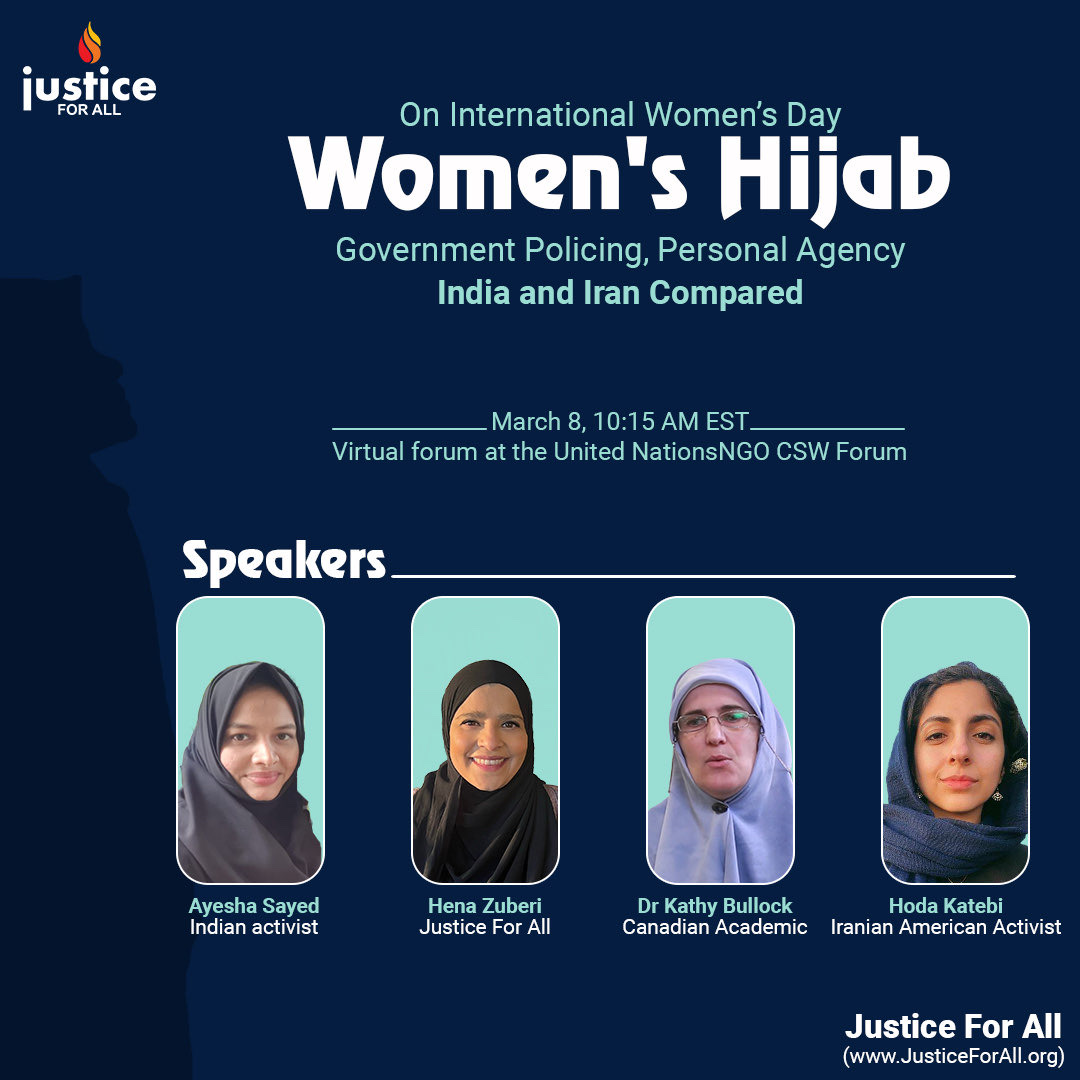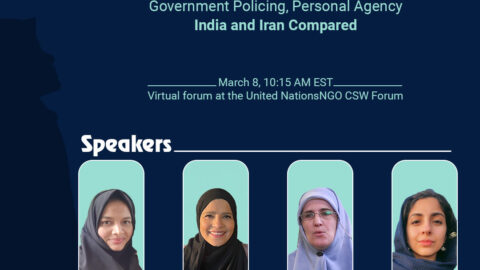
On International Women’s Day Women’s Hijab Government Policing, Personal Agency India and Iran Compared
On International Women’s Day, March 8, Justice for All held a virtual panel discussion entitled Women’s Hijab: Government Policing & Personal Agency; India and Iran Compared. This event is one of several dozen similar events offered by UN missions and non-governmental organizations as a part of the 67th United Nations Commission on the Status of Women. The link to the webinar is included below.
The discussion, moderated by Justice for All’s Hena Zuberi, included Dr. Kathy Bullock, a lecturer in political science and political Islam at the University of Toronto, and Ayesha Sayed, an Indian student-activist. Each of the three panelists brought a unique perspective to the issue at hand, though all ultimately converged upon the same conclusion: protecting a woman’s right to wear a hijab is essential to respecting human dignity and promoting freedom of expression and religion.
Dr. Bullock began the discussion with a concise yet comprehensive overview of the origins of restrictions relating to the wearing of hijab, whether against its wearing in India or mandating its wearing in Iran. Dr. Bullock delved into the judicial and political shift towards Hindu nationalism in India that, operating on both political-structural and individual levels, has curtailed religious freedom primarily for Indian Muslims, who constitute 15 percent of the Indian population.
Shifting to the mandating and enforcement—through an established ‘morality police’—of hijab-wearing in Iran, Dr. Bullock again emphasized state utilization of religious ideas to implement restrictions on free expression. The Iranian state has employed conservative Shia interpretations of Islamic religious and social thought to go beyond moral exhortation to the outright violation of a right to expression. Both examples, Dr. Bullock concluded, necessarily constitute the undermining of principles of free expression and freedom of religion, which stand as truly fundamental values and rights.
Then, via a pre-recorded video, Ayesha Sayed offered her experience with Indian laws banning hijab-wearing in educational institutions. She first covered the broader spread of state-sanctioned mob violence that sought to coerce, including through the direct use of force, women and girls into not wearing burqas and hijab. These groups, firm adherents of Hindutva ideology, generally are condoned governmentally and, in some cases, are even supported by government leaders, rendering legal challenges and recourse unlikely.
Ms. Sayed subsequently discussed her experience of being forced to leave law school, underscoring the fundamental injustice of denying individuals— women and girls—educational opportunities. Following the end of the video, Dr. Bullock weighed in on religious discrimination in India through hijab laws, underscoring that the laws did not ban all head coverings or all religious symbolism, as in France or Quebec, but merely for Muslim women.
The last quarter of the discussion was dedicated to audience Q&A. Panelists engaged extensively with a question that asked how hijab-wearing—and associated restrictions—have been or continue to be used as political tools. Dr. Bullock, speaking as an academic with substantial experience in the study of political Islam, explored the differences in the invocation of hijab-wearing from nation to nation. In Turkey, she noted, the AKP and other Islamist-leaning parties raise the spectre of a ban on hijab-wearing in the event of a Kemalist-secularist electoral victory to drive rural, conservative turnout.
In contrast, states or regions, like France or Quebec, with strong traditions of laïcité, ban the public wearing of religiously symbolic clothing generally, which nevertheless has a disproportionate impact on Muslim women; election cycles in the West too often frame hijab-wearing as fundamentally coercive, missing the choice intrinsic to hijab-wearing emphasized by Ms. Zuberi and Dr. Bullock alike.
The panel concluded by answering a question of how non-Muslims ought to support hijab-wearing women. Dr. Bullock suggested that individuals should listen thoughtfully to Muslim women, support and provide a platform for them to share their voices, and advocate rigorously and even-handedly to defend the fundamental rights to expression and free practice of religion, whether in Iran, India, or France.




